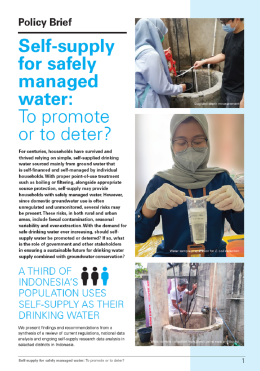RWSN Library

Author
Priadi, C.R., G. L. Outri, T. Foster, J. Willets and M. Odagiri
Year of Publishing
2022
Publisher
UNICEF
Institution
Self-supply for safely managed water: To promote or to deter?
Policy Brief
Description:
For centuries, households have survived and thrived relying on simple, self-supplied drinking water sourced mainly from ground water that is self-financed and self-managed by individual households. With proper point-of-use treatment such as boiling or filtering, alongside appropriate source protection, self-supply may provide households with safely managed water. However, since domestic groundwater use is often unregulated and unmonitored, several risks may be present. These risks, in both rural and urban areas, include faecal contamination, seasonal variability and over-extraction. With the demand for safe drinking water ever increasing, should selfsupply
water be promoted or deterred? If so, what is the role of government and other stakeholders in ensuring a sustainable future for drinking water supply combined with groundwater conservation?
Bibliographical Information:
Priadi, C.R., G. L. Outri, T. Foster, J. Willets and M. Odagiri (2022) Self-supply for safely managed water: To promote or to deter?. Policy Brief , UNICEF , Jakarta, Indonesia
DOWNLOADS (44)
Self-supply for safely managed water: To promote or to deter?
 Google Übersetzer
Google Übersetzer
